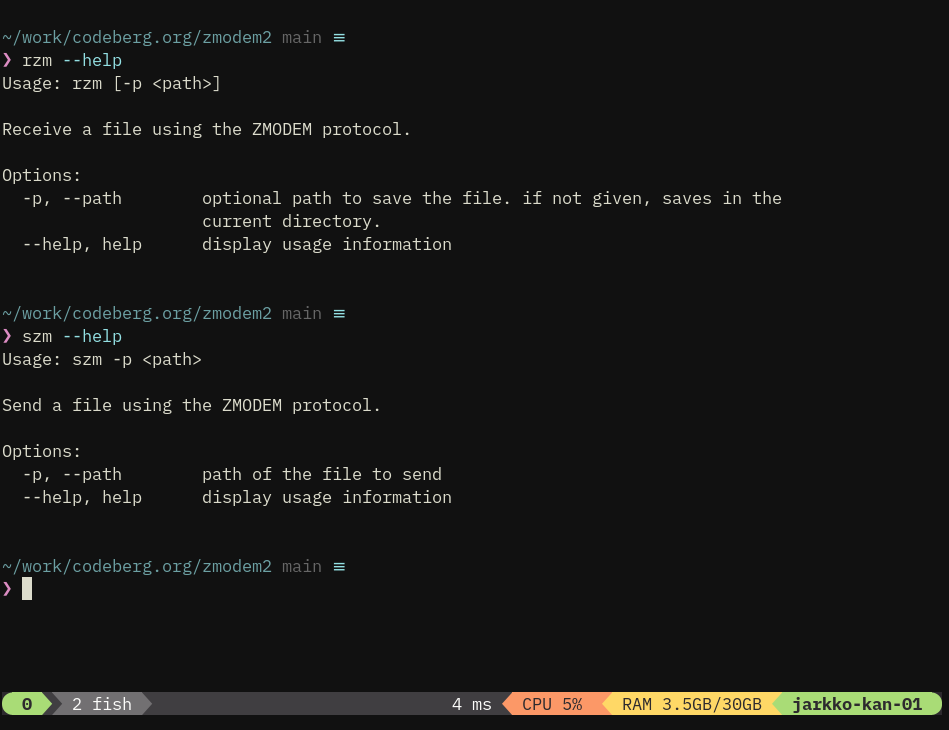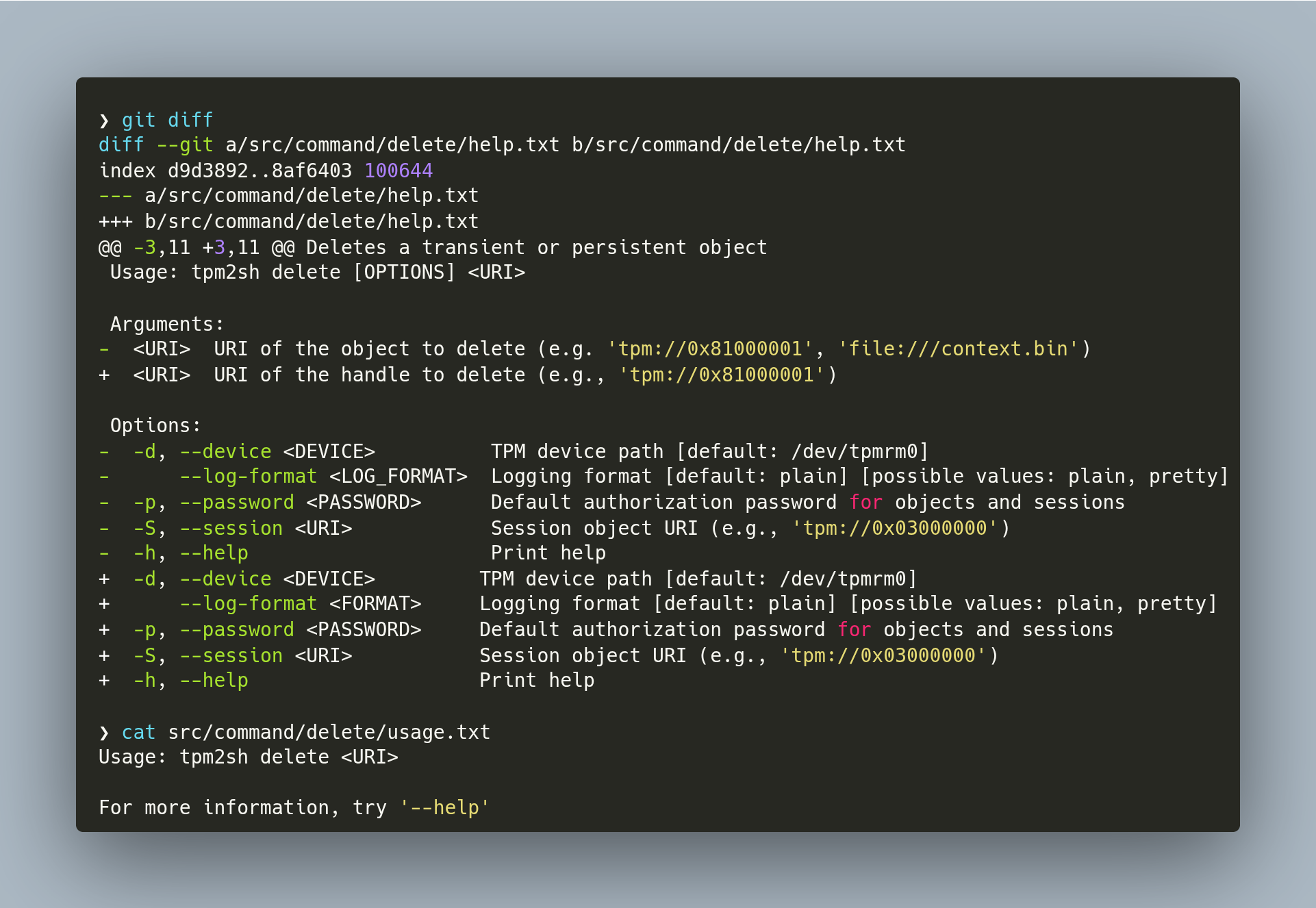Posts
4927Following
327Followers
491OpenPGP: 3AB05486C7752FE1
Jarkko Sakkinen
jarkkoE.g. first PoC TpmBuffer I have from trait instead of get(), which I likely change also in integer: https://git.kernel.org/pub/scm/linux/kernel/git/jarkko/tpm2-protocol.git/commit/?h=zerocopy&id=68caecf1eceac25d8f3f819ef5f7c794ffcc9177. And next thing is TpmList and then some weeks bouncing around these basic data types until they "feel" right :-)
I.e. I try to create zerocopy non-destructively without breaking the working build/parse implementation while putting this stuff in...
Jarkko Sakkinen
jarkkoCan you use ident to play a type e.g.,
impl<'a> PartialEq<$ty> for TpmView<'a> {
fn eq(&self, other: &$ty) -> bool {
self.get() == *other
}
}
If “$ty” was ident, would this work?
Jarkko Sakkinen
jarkkoJarkko Sakkinen
jarkkoAnother more fun Rust related activity is figuring out how to nail batch file transfer test planning with emulated serial port that throttles the speed to a target BPS (in future also should have also signal noise emulation):
const ADJECTIVES: &[&str] = &["Quiet", "Loud", "Fast", "Slow", "Bright", "Dark"];
const NOUNS: &[&str] = &["One", "Two", "Three", "Four", "Five,", "Six"];
const EXTENSIONS: &[&str] = &["dat", "BIN", "log", "TMP", "txt"];
struct MockPort<R: Read, W: Write> {
r: R,
w: W,
bits_per_second: u32,
next_byte_due: Instant,
}
It generates 10 pseudorandom filenames and 100 KiB payloads.
Jarkko Sakkinen
jarkkoJust solved a Rust sudoku for the next version of tpm2-protocol
I think this is quite clever trick to surpass some of the limitation of syntax tree macros:
macro_rules! tpm_integer {
($ty:ty) => {
pub mod $ty {
#[derive(Clone, Copy, Debug)]
pub struct TpmView<'a> {
pub slice: &'a [u8],
}
}
};
}
Further, TpmView implements a trait called TpmView. This circulates around limitation that type cannot be used to name things in syntax tree macros.
Otherwise, unless moving into procedural macros, I’d end up ugly declarations along the lines of:
tpm_integer!(u8, TpmViewU8, Unsigned);
tpm_integer!(i8, TpmViewI8, Signed);
tpm_integer!(u16, TpmViewU16, Unsigned);
tpm_integer!(i32, TpmViewI32, Signed);
tpm_integer!(u32, TpmViewU32, Unsigned);
tpm_integer!(u64, TpmViewU64, Unsigned);
Transparency has been the single biggest blocker in moving forward with zerocopy parser and this sort of “nails it”.
EDIT
I was wrong in that you could type as module name. However, the trick does still resolve the name coflict with the original type and view type. The minor inconvience of having to repeat it twice is totally acceptable vs having to manually name stuff:
tpm_integer!(u8, u8, Unsigned);
tpm_integer!(i8, i8, Signed);
tpm_integer!(u16, u16, Unsigned);
tpm_integer!(i32, i32, Signed);
tpm_integer!(u32, u32, Unsigned);
tpm_integer!(u64, u64, Unsigned);
This is absolutely sustainable for me :-) I.e. second parameter is name of the module.
Here’s a working proof of concept: https://git.kernel.org/pub/scm/linux/kernel/git/jarkko/tpm2-protocol.git/commit/?h=zerocopy&id=42f61d9d85e17f784f71c8ac64ee6adbb7171997
Jarkko Sakkinen
jarkkoJust like tpm2-protcol, this is a mailing list project and will be hosted at git.kernel.org.
'tpm2-policy' provides an expressive language for policies and can additionally "open code" input expressions e.g., set actual values for PCRs (if they are unspecified and digest is composed it queries them from TPM).
It can compose digests both via means of TPM2_Policy* command but in addition is capable for software composition (not yet landed tho but coming soon ;-))
The big picture design principle in this crate is, just like in tpm2-protocol, that it scales both to client use, and at the same time software composition engine is capable of empowering TPM emulator or even a real chip.
#linux #rust #tpm
Jarkko Sakkinen
jarkkoJarkko Sakkinen
jarkko0176 Success 80010000002000000000800200000010bbbbbbbbbbbbbbbbbbbbbbbbbbbbbbbb
017E TrailingData 800100000038000000000000000100000000000000010020aaaaaaaaaaaaaaaaaaaaaaaaaaaaaaaaaaaaaaaaaaaaaaaaaaaaaaaaaaaaaaaadeadbeef
0144 NotDiscriminant("TpmSt", Unsigned(0xffff)) ffff0000000a00000000
0176 Success 80010000003000000000030000000020ab967bc21b9c90096051d1e0f0dbfb29fc27258b03705fbc0c40aaaac88ed5e5
This also helps to better understand whether the pre-existing error codes make sense, how they should be modified, what should be added/removed etc. in the future versions of this crate.
Jarkko Sakkinen
jarkko❯ sudo target/debug/tpm2sh policy "pcr(sha256:0,7)"
pcr(sha256:0,7, 9c367f8c268d51ced151a664d88e37e74fcd84485eff8ff9bc26d22aa9091020)
With --compose flag it creates the policy digest.
Jarkko Sakkinen
jarkkoIt's more like UI problem than a technical problem. A great cli is such that you can put it powerpoint sheet and everyone will get it down to reconfiguring your computers.
#tpm #rust #linux
Jarkko Sakkinen
jarkkoMigrated few more tests to data-driven format and renamed the original test tool as 'adhoc.rs' for tests that don't fit to the data-driven framework (yet).
I think this will cage the implementation right way and over time the factor to break it will grow...
Jarkko Sakkinen
jarkko- Text files are more readable than code generation (unless you are a compiler).
- Text files has factors better outreach than code generation.
- Text files are non-executable read-only data.
- A bug in a static text file is a typo. Typo is a distraction for sure, but it does not radiate software bugs.
- The factor it simplifies command argument processing is much heavier than some minor redundancy that using text files introduces.
- Text files can be read without building a project.
#rust #clap #lexopt
Jarkko Sakkinen
jarkkoZerocopy will be easy to implement now that I’ve found out how it is done by experimenting with basic types.
Memory requirements are relaxed as in:
- Before (0.10.x): stack is required for the artifact
- After (0.11.x): a CPU with registers will do for the memory, and read-only address for the input data.
70-80% of code base will be re-usable and remaining 20% is rewriting macros, tweaking a few call sites and creating a few new traits for macro consumption.
Despite 0.10.x having clone semantics, it is the correct traversal that is the hard problem here and it needs to be solved only once that data can be used to inject slice markers to exactly correct locations. This is why also parsing or building process nees no extra memory other than CPU cores registers.
The number lines in implementation will with higher odds go down rather than up. Looking pretty good…
Jarkko Sakkinen
jarkkoI'm specifically not interested on "how to program proc macros tutorial". At this point more about "geometry" and how they link and in essence all bin related info.
#rust #cargo #macros
Jarkko Sakkinen
jarkkoLast fix: https://github.com/puavo-org/tpm2sh/commit/3627530516fdcc8739b3c7aea6fab6a136201bfa
It's a bidirectional test where both the client and the emulator are based on tpm2-protocol. The other side sends commands and parses responses, and the other side send responses and parses commands.
Given the fair amount of software crypto involved to perform any possible bidirectional handshake it is shows off pretty well how robust the implementation is.
#rust #tpm #linux


